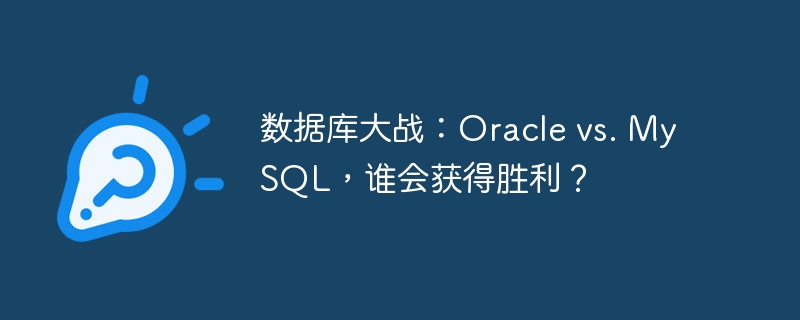

Database Wars: Oracle vs. MySQL, who will win?
In today's digital era, databases have become the core tool for enterprises and organizations to manage data. Among many database management systems, Oracle and MySQL are undoubtedly the two giants. They have a wide user base and strong competitiveness in the market. So, when Oracle and MySQL start a fierce battle, who will win?
First of all, speaking of Oracle, it is a powerful and highly scalable relational database management system. Developers with sufficient experience can leverage Oracle's sophisticated features and powerful tools to handle large-scale data. Oracle has good transaction management capabilities and can provide highly reliable data consistency and integrity. In addition, Oracle also provides a wealth of security control functions to make data more secure and reliable during storage and transmission.
However, Oracle's high availability and high performance requirements require expensive hardware equipment and a professional management team to support it. Its licensing fees are also relatively high, which can be a burden for small and medium-sized businesses. In addition, Oracle's learning curve is relatively steep and requires a long time and effort to master. Therefore, Oracle may not be an ideal choice for enterprises with limited resources.
In contrast, MySQL is a relational database management system suitable for small and medium-sized enterprises and individuals. One of the advantages of MySQL is its free and open source license, which allows users to freely use and modify the source code. In addition, MySQL is simple and easy to use, and the threshold for learning and using is low. Especially for web application developers, MySQL has good compatibility and stability, and can provide high-performance data storage and access services.
However, precisely because of MySQL's open source form, it may not be comparable to Oracle in terms of some advanced features and performance. MySQL may face certain challenges when handling large-scale data and complex queries. In addition, because its source code is public, MySQL may have certain potential risks in terms of security. Therefore, MySQL may not be the best choice for some enterprises with higher security requirements.
To sum up, Oracle and MySQL have their unique advantages and disadvantages in their respective fields. As people often say "the tool lies in the user", choosing an appropriate database management system depends on the specific needs and conditions of the enterprise or individual. For large enterprises and scenarios with high complexity of requirements, Oracle may be a more ideal choice, as it provides powerful functions and high reliability. For small and medium-sized enterprises and individual users, MySQL may be more cost-effective and meet basic data management needs through its simplicity and ease of use.
However, with the continuous development of technology and the continuous evolution of database management systems, it is not easy to say who will win in the future. With the continuous emergence of artificial intelligence, cloud computing and big data, database management systems will inevitably face new challenges and opportunities. Whether it is Oracle or MySQL, only continuous innovation and progress can maintain a competitive advantage in the database war and become the first choice of users.
In short, both Oracle and MySQL in the database war have their unique advantages and disadvantages. No matter who wins in the database market, it depends on whether it can continuously meet user needs and provide safe, stable, and high-performance data management services. It is believed that in the future, driven by technology, database management systems will further evolve and innovate, bringing better user experience and enterprise benefits.
The above is the detailed content of Database Wars: Oracle vs. MySQL, who will win?. For more information, please follow other related articles on the PHP Chinese website!




